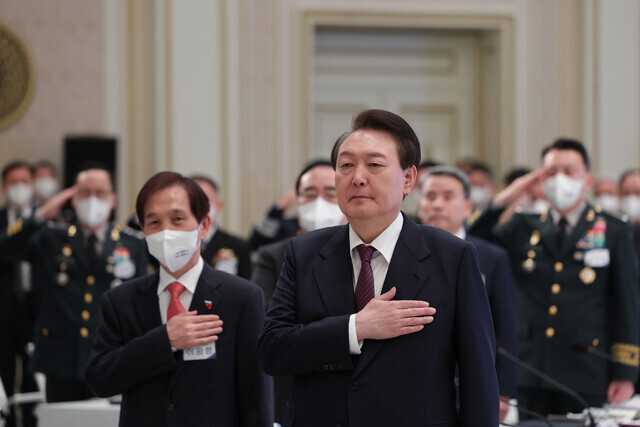hankyoreh
Links to other country sites 다른 나라 사이트 링크
[Editorial] Yoon wants nukes, but what he needs is a reality check

President Yoon Suk-yeol raised eyebrows last week when he mentioned the possibility of South Korea possessing its own nuclear weapons as a way to counter the North Korean nuclear threat.
Although he added a condition, saying the situation would first have to get more “serious,” these comments mark the first time a South Korean president directly mentions the possibility of independent nuclear armament. As such, the weight of his words is significant.
The US, however, quickly expressed its position by reaffirming its support for the principle of the denuclearization of the Korean Peninsula. It is concerning that Yoon's thoughtless and hawkish remarks are repeatedly causing confusion.
After receiving briefings from the Ministry of Foreign Affairs and Ministry of National Defense on Jan. 11, Yoon said that, if North Korean provocations become more serious “South Korea could have tactical nuclear weapons deployed or secure its own nuclear weapons.” The president added that “if things turn out this way, we will be able to acquire [nuclear weapons] quickly thanks to our science and technological capabilities.”
In response, the White House repeatedly emphasized the goal of the denuclearization of the Korean Peninsula the next day, subtly revealing its unsupportive stance about Seoul possibly choosing a nuclear path.
It is doubtful that Yoon properly considered the weight of his words or the possible repercussions of his remarks.
As a result of his comments, officials in the presidential office and the National Defense Ministry are now busy trying to get a handle on the situation, saying the president's comments were not referring to a proposal for South Korea's own nuclear armament, but were instead “emphasizing extended deterrence.”
But this isn't the first time that remarks by the president have caused controversy. For example, on Jan. 2, Yoon floated the idea of joint nuclear exercises with the US in an interview with the Chosun Ilbo newspaper. Soon after, however, US president Joe Biden dismissed the comment, answering “No” when asked if the US was considering Yoon's idea.
With North Korea strengthening its nuclear capabilities and continuing its nuclear threats against South Korea, it is absolutely necessary for Seoul to come up with its own well-thought-out countermeasures to deal with the situation.
There are various arguments on the best approach to take, including the nuclear armament option. However, it’s clear that if South Korea decides to develop its own nuclear weapons, unaffordable costs will have to be paid as a result of violating the Non-Proliferation Treaty and related sanctions that come with it. Not to mention how such a move would accelerate nuclear proliferation in Northeast Asia like a domino effect and result in nuclear competition.
With the situation being this sensitive, it is highly inappropriate for the president, who should be making thoughtful comments, to bring up nuclear armament in such a public and official manner.
It is even more irresponsible if his remarks were made with a political purpose, keeping in mind public opinion about nuclear armament, which has particularly been gaining traction in conservative circles.
Isn't this also closely interlinked with the president's recent excessive hardline remarks against North Korea that have further raised tensions and anxiety about the security situation? For example, the president called for South Korea’s military to secure the ability to hit back “100 or 1,000 times harder” in case of attack and for "overwhelmingly superior preparations for war.”
We hope the government will first focus on refining as much as possible realistic measures that will help strengthen the US extended deterrence in practice. In addition, the US should also recognize South Korea's security concerns seriously and show their good faith to strengthen the extended deterrence beyond just words in a practical and effective way.
Please direct questions or comments to [english@hani.co.kr]

Editorial・opinion
![[Column] The state is back — but is it in business? [Column] The state is back — but is it in business?](https://flexible.img.hani.co.kr/flexible/normal/500/300/imgdb/original/2024/0506/8217149564092725.jpg) [Column] The state is back — but is it in business?
[Column] The state is back — but is it in business?![[Column] Life on our Trisolaris [Column] Life on our Trisolaris](https://flexible.img.hani.co.kr/flexible/normal/500/300/imgdb/original/2024/0505/4817148682278544.jpg) [Column] Life on our Trisolaris
[Column] Life on our Trisolaris- [Editorial] Penalties for airing allegations against Korea’s first lady endanger free press
- [Editorial] Yoon must halt procurement of SM-3 interceptor missiles
- [Guest essay] Maybe Korea’s rapid population decline is an opportunity, not a crisis
- [Column] Can Yoon steer diplomacy with Russia, China back on track?
- [Column] Season 2 of special prosecutor probe may be coming to Korea soon
- [Column] Park Geun-hye déjà vu in Yoon Suk-yeol
- [Editorial] New weight of N. Korea’s nuclear threats makes dialogue all the more urgent
- [Guest essay] The real reason Korea’s new right wants to dub Rhee a founding father
Most viewed articles
- 1[Column] Why Korea’s hard right is fated to lose
- 2Amid US-China clash, Korea must remember its failures in the 19th century, advises scholar
- 360% of young Koreans see no need to have kids after marriage
- 4[Column] The state is back — but is it in business?
- 5Hybe-Ador dispute shines light on pervasive issues behind K-pop’s tidy facade
- 6[Column] Can Yoon steer diplomacy with Russia, China back on track?
- 7Inside the law for a special counsel probe over a Korean Marine’s death
- 8Japan says it’s not pressuring Naver to sell Line, but Korean insiders say otherwise
- 9[Editorial] Penalties for airing allegations against Korea’s first lady endanger free press
- 10Presidential office warns of veto in response to opposition passing special counsel probe act